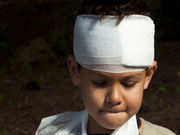Early head trauma linked to psychiatric, financial issues as adults, researchers find
WEDNESDAY, Aug. 24, 2016 (HealthDay News) — Children and adolescents who suffer even mild traumatic brain injury (TBI) are more likely to have serious issues later on, including psychiatric disorders and premature death, according to a study published online Aug. 23 in PLOS Medicine.
Seena Fazel, M.D., professor of forensic psychiatry at the University of Oxford in the United Kingdom, and colleagues analyzed long-term data of cases in which most patients had one mild TBI, or concussion. Participants, who were born between 1973 and 1985, were 13 years old on average when they were injured. After age 26, they were followed for an average of eight years.
The researchers found that TBI was consistently linked to premature mortality, psychiatric treatment, and low educational attainment. Individuals who had TBI were also more likely to be receiving welfare or dependent on disability pensions. Notably, those who had TBI had a more than 10 percent risk of being diagnosed with a psychiatric disorder in adulthood and a 2 percent risk of dying prematurely. Compared to their unaffected siblings, TBI patients were twice as likely to be hospitalized for psychiatric disorders and 80 percent more likely to receive a disability pension.
“Given our findings, which indicate potentially causal effects between TBI exposure in childhood and later impairments across a range of health and social outcomes, age-sensitive clinical guidelines should be considered and preventive strategies should be targeted at children and adolescents,” the authors write.
Full Text
Copyright © 2016 HealthDay. All rights reserved.








